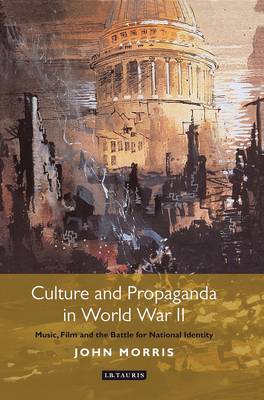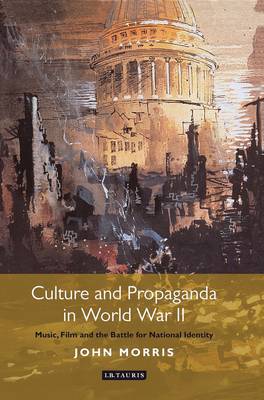
Bedankt voor het vertrouwen het afgelopen jaar! Om jou te bedanken bieden we GRATIS verzending (in België) aan op alles gedurende de hele maand januari.
- Afhalen na 1 uur in een winkel met voorraad
- In januari gratis thuislevering in België
- Ruim aanbod met 7 miljoen producten
Bedankt voor het vertrouwen het afgelopen jaar! Om jou te bedanken bieden we GRATIS verzending (in België) aan op alles gedurende de hele maand januari.
- Afhalen na 1 uur in een winkel met voorraad
- In januari gratis thuislevering in België
- Ruim aanbod met 7 miljoen producten
Zoeken
Culture and Propaganda in World War II
Music, Film and the Battle for National Identity
John Morris
Paperback | Engels
€ 76,45
+ 152 punten
Uitvoering
Omschrijving
The wartime period in Britain is viewed as an extremely fertile period of British creativity in music, film and art. Often these projects were funded and supported by the government, who understood its role as a custodian of British culture and, by extension, of British values at a time where those values were under threat. In the late 1930s, the Nazi Party had stressed the superiority of Germanic culture and the promotion of Richard Wagner and Carl Orff was central to Hitler's cultural program. In Britain, the War Office under Winston Churchill chose to promote Edward Elgar and Hubert Parry, but also to appropriate and 'de-Nazify' Ludwig van Beethoven, whose Fifth Symphony was used extensively in wartime broadcasts and has since become synonymous with VE Day. Meanwhile, the work of Ralph Vaughn Williams, whose music was commissioned by Powell and Pressburger for use in 49th Parallel, reclaimed a particularly English past stretching back to the Tudors.
While artists such as John Piper, Eric Ravillious and Evelyn Dunbar produced works specifically commissioned by the state, which were intended to commemorate and glorify Britain, the British Council and the BBC played an active role in commissioning and broadcasting their musical equivalents. In film, Humphrey Jenning's documentaries were designed to further push the wartime agenda, along with films produced by Ealing Studios. Using detailed archival research, John Morris sheds new light on wartime Britain and provides essential reading for historians, musicians, film scholars and propaganda analysts of this period.
While artists such as John Piper, Eric Ravillious and Evelyn Dunbar produced works specifically commissioned by the state, which were intended to commemorate and glorify Britain, the British Council and the BBC played an active role in commissioning and broadcasting their musical equivalents. In film, Humphrey Jenning's documentaries were designed to further push the wartime agenda, along with films produced by Ealing Studios. Using detailed archival research, John Morris sheds new light on wartime Britain and provides essential reading for historians, musicians, film scholars and propaganda analysts of this period.
Specificaties
Betrokkenen
- Auteur(s):
- Uitgeverij:
Inhoud
- Aantal bladzijden:
- 256
- Taal:
- Engels
Eigenschappen
- Productcode (EAN):
- 9781350159068
- Verschijningsdatum:
- 30/04/2020
- Uitvoering:
- Paperback
- Formaat:
- Trade paperback (VS)
- Afmetingen:
- 140 mm x 216 mm
- Gewicht:
- 303 g

Alleen bij Standaard Boekhandel
+ 152 punten op je klantenkaart van Standaard Boekhandel
Beoordelingen
We publiceren alleen reviews die voldoen aan de voorwaarden voor reviews. Bekijk onze voorwaarden voor reviews.









